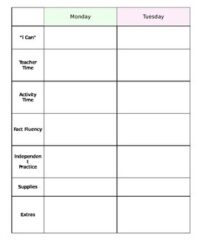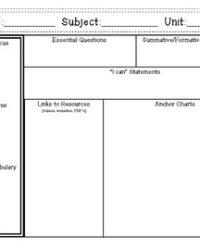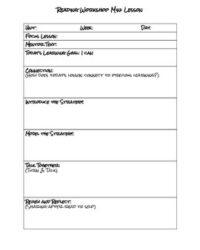Ever found yourself wanting to make math class more engaging, more student-centered, and truly impactful for every single learner in your room? The traditional “stand and deliver” model often leaves some students behind while others are itching for more challenge. That’s where the math workshop model shines, transforming your classroom into a vibrant, active learning space where differentiation isn’t just a buzzword, but a reality.
Implementing a math workshop can feel like a big shift, but with the right structure, it becomes incredibly empowering for both teachers and students. Imagine having a clear roadmap for your daily math instruction, ensuring you hit all your learning objectives while meeting diverse needs. A well-designed math workshop model lesson plan template is your secret weapon for making this a smooth, successful, and sustainable approach.
Understanding the Core Components of a Math Workshop
At its heart, the math workshop model is a structured framework that typically includes a whole-group mini-lesson, differentiated small group work or independent practice, and a wrap-up or share session. This cycle allows for focused direct instruction, followed by varied opportunities for students to practice, explore, and apply their understanding at their own pace and level.
The Mini-Lesson: Setting the Stage
The workshop begins with a concise, whole-group mini-lesson, usually lasting about 10-15 minutes. This isn’t a long lecture, but rather a focused introduction to a new concept, a quick review of a tricky skill, or a demonstration of a strategy. The goal is to provide just enough explicit instruction to launch students into their independent work or small group activities. Think of it as planting the seed for the day’s mathematical journey, ensuring everyone has a common starting point before they branch out.
Differentiated Rotations: The Heart of the Workshop
Following the mini-lesson, students transition into various rotations or stations, which is where the magic of differentiation truly happens. This is typically the longest segment of the workshop, often 30-45 minutes. While you might be pulling a small group for targeted instruction, other students could be engaged in independent practice, working on a collaborative project, or utilizing digital tools for reinforcement or enrichment. The beauty here is that students are actively working on tasks tailored to their readiness, interests, and learning styles, allowing you to provide focused support where it’s needed most.
The Share Time: Consolidating Learning
The workshop concludes with a brief whole-group share time, usually 5-10 minutes. This is a crucial opportunity for students to come back together, reflect on their learning, share strategies, discuss challenges, and generalize key mathematical ideas. It’s a chance to highlight student thinking, address common misconceptions, and celebrate successes. This reflective period helps consolidate learning, reinforcing the big ideas introduced in the mini-lesson and explored during the rotations.
Crafting Your Own Effective Math Workshop Model Lesson Plan Template
Creating a consistent and effective math workshop doesn’t happen by accident; it’s the result of thoughtful planning. A personalized math workshop model lesson plan template is an invaluable tool for streamlining your preparation, ensuring every component is covered, and maintaining a clear vision for your daily math block. It helps you anticipate student needs, organize your materials, and manage your time efficiently, turning what might seem like a complex structure into a smooth, predictable routine for both you and your students.
Having a template means you’re not reinventing the wheel every day. Instead, you’re filling in the blanks for the specific content and student needs of that particular lesson. This frees up mental energy, allowing you to focus more on observation and individualized support during the actual workshop. It’s about working smarter, not harder, to create a truly dynamic and responsive math learning environment.
When designing your math workshop model lesson plan template, consider including these essential sections to ensure comprehensive coverage and clarity for each lesson:
- Lesson Objective(s): What specific learning goals do you want students to achieve?
- Materials Needed: A comprehensive list of everything required for the mini-lesson, rotations, and share time.
- Mini-Lesson Plan: Outline the introduction, direct instruction, and active engagement strategy.
- Rotation Details:
- Teacher-Led Small Group: Specific focus, activities, and target students.
- Independent Practice/Work: Task details, expected outcomes, and differentiation for varying levels.
- Technology/Games Station: Designated apps, websites, or math games.
- Collaborative Task/Project: Group expectations and materials.
- Share/Wrap-up Plan: How will students reflect and consolidate their learning?
- Assessment Notes: How will you informally or formally assess understanding during the workshop?
- Differentiation Notes: Specific plans for supporting struggling learners and challenging advanced students.
Embracing the math workshop model, supported by a clear and customizable template, can revolutionize your math instruction. It cultivates a classroom where students are active participants in their learning, where every minute is purposeful, and where you, as the teacher, can provide targeted support exactly when and where it’s needed. It’s a journey towards more engaged learners and deeper mathematical understanding.
By investing time in creating and utilizing a robust framework like a math workshop model lesson plan template, you’re not just planning lessons; you’re building a foundation for mathematical confidence and curiosity that will serve your students far beyond the classroom walls. It’s an empowering approach that benefits everyone involved, making math truly come alive.


